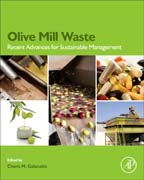
Olive Mill Waste addresses the most relevant topics of olive oil industry sustainable management today. Emphasizing recent advisable practices, the potentiality of reutilizing OMW to power the mill itself, the reuse of OMW as soil amendment, aerobic biological treatment of OMW and compost production, the case study of OMW within the biorefinery concept, the recovery of bioactive compounds from OMW as well as their applications in food products and cosmetics. Recent research efforts have concluded that the successful management of OMW focuses on three main routes: (a) reuse of water, (b) reuse of polyphenols and (c) reuse of nutrients. Following this consideration, Olive Mill Waste covers sustainable practices of olive oil industry reveals the opportunities of reutilizing the water of OMW within the process or as soil amendment. At the same time, it explores in depth all the possibilities of recovering polyphenols and reutilizing them in target products such as foods and cosmetics. In addition, the book presents successful cases of industrial OMW valorization through real world experiences. Covers the most recent advances in the field of olive mill waste management following the sustainability principlesFills the gap of transfer knowledge between academia and industry, by describing in details the few viable industrial applications and scenariosExplores the advantages, disadvantages and real potentiality of processes and products in the market INDICE: 1. Olive Oil Production Sector: Environmental Effects and Sustainability Challenges 2. Olive Mill Waste: Recent Advances for the Sustainable Management of Olive Oil Industry 3. The Biorefinery Concept for the Industrial Valorization of Residues from Olive Oil Industry 4. Energy recovery alternatives for the sustainable management of olive oil industry 5. Reuse of olive mill waste as soil amendment 6. Industrial case studies on the detoxificaton of OMWW using Fenton oxidation process followed by biological processes for energy and compost production 7. Integrated Biological Treatment of Olive Mill Waste Combining Aerobic Biological Treatment, Constructed Wetlands and Composting 8. Co-Composting of Olive Mill Waste for the Production of Soil Amendments 9. The use of olive mill wastewater to promote phytoremediation 10. Recovery of bioactive compounds from olive mill waste 11. Applications of recovered bioactive compounds in food products 12. Applications of recovered bioactive compounds in cosmetics and health care products
- ISBN: 978-0-12-805314-0
- Editorial: Academic Press
- Encuadernacion: Rústica
- Páginas: 328
- Fecha Publicación: 16/01/2017
- Nº Volúmenes: 1
- Idioma: Inglés
